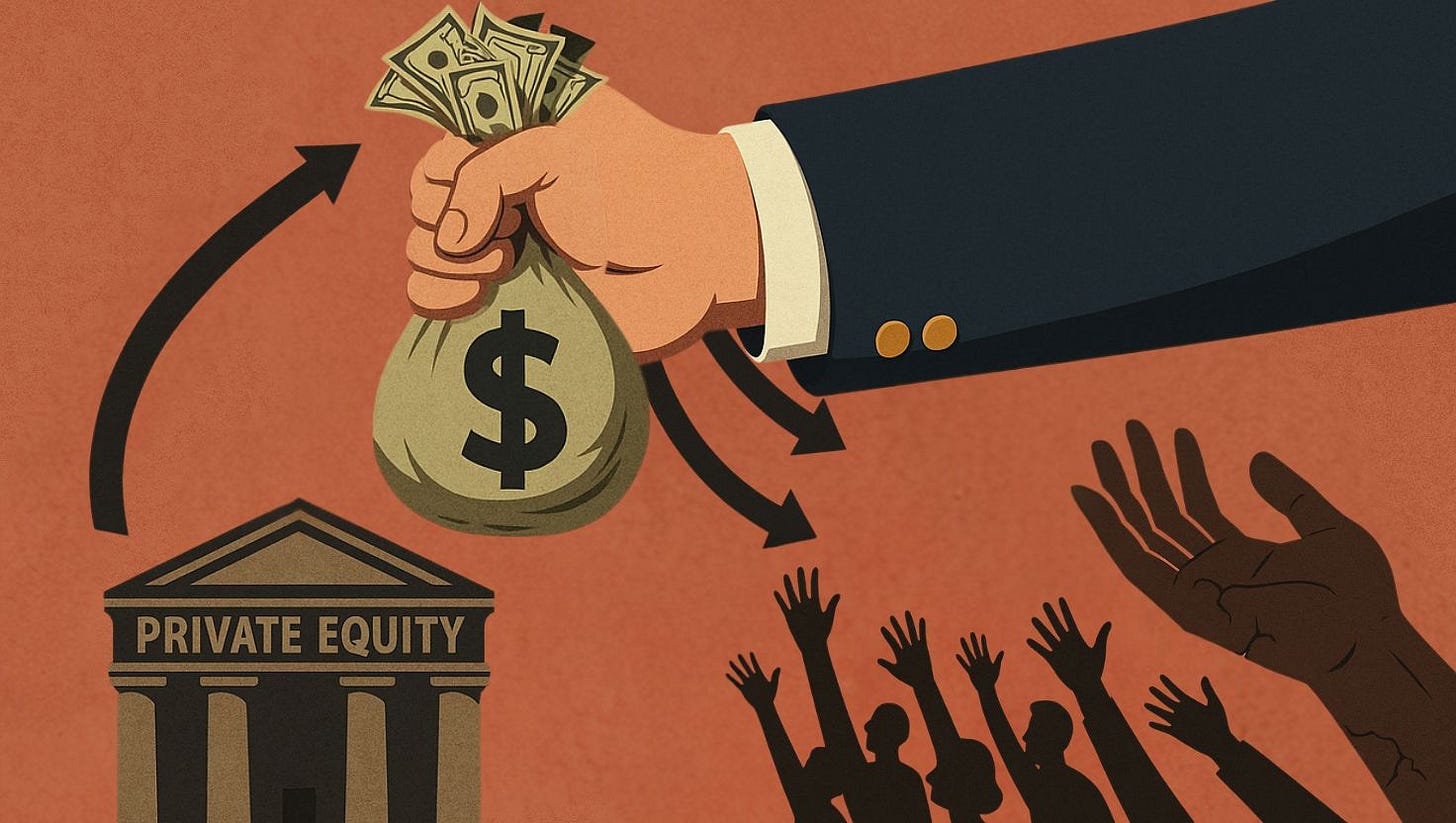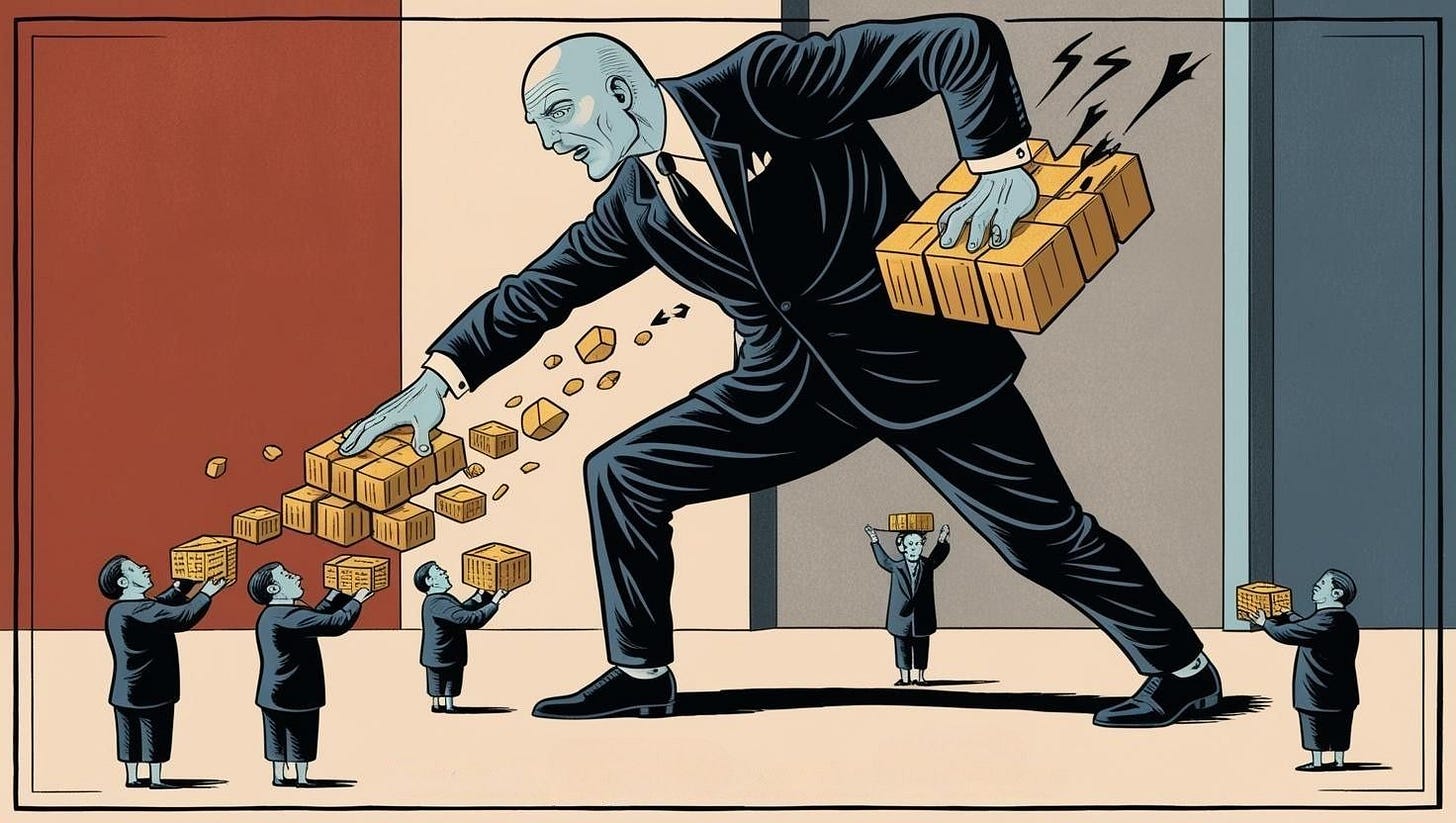The far-reaching tentacles of private equity
A recent chat with Peter Grandich, as well as a question from a loyal reader, prompted this quick dive into how our system is skewed to favor private equity firms.
If you rent a home in the United States, there’s nearly a 1 in 10 chance your landlord is a private equity firm. The same odds apply if you show up at a privately run emergency room. And for 12 million workers — mostly in low-wage jobs like fast food, retail, or security — the boss at the very top of the corporate ladder is private equity.
Private equity firms make their money by buying up companies or property, taking control, cutting costs, and then selling them off for a profit. On paper, it's about efficiency. In reality, it often means layoffs, higher prices, and degraded services.
Research shows companies taken over by private equity are significantly more likely to go bankrupt. Leveraged buyouts are estimated to have led to nearly 600,000 retail job losses over the past decade. Housing advocates and renters say private equity companies are known for charging exorbitant rents and fees, neglecting repairs, and aggressively threatening tenants with eviction. Under private equity ownership, ambulance response times worsened and inadequate care led to at least two alleged deaths, according to a New York Times investigation. Private equity ownership of nursing homes has been linked to increased mortality, understaffing, and lower patient well-being.
A system built to exploit
Here’s a case in point, brilliantly illustrated by Brendan Ballou in his 2023 book, ‘Plunder: Private Equity’s Plan to Pillage America’. In 2007, the Carlyle Group bought a nursing home chain called ManorCare using borrowed money — debt that ManorCare itself had to pay back. Carlyle sold off ManorCare’s real estate, forcing the company to lease back its own buildings at inflated prices.
To stay afloat, ManorCare laid off staff and cut corners. Health code violations soared. One resident died after she was left to walk to the bathroom alone, hit her head, and never received proper treatment. Carlyle denied responsibility claiming that, technically, it didn’t “own” ManorCare — it just advised the fund that did.
This is by design. Private equity firms wield control without taking responsibility. They profit when things go well and walk away when they don’t. It’s ‘heads we win, tails you lose.’ Big players like Blackstone, Carlyle, Apollo, and KKR are publicly traded and face some SEC oversight, but the bulk of the industry operates in the shadows — using legal loopholes and weak regulation to avoid scrutiny.
Governments — under pressure to avoid tax hikes or austerity — are increasingly turning to private capital to rebuild crumbling infrastructure. But the trade-off is steep: policies are rewritten to guarantee investor returns. Landlords get favored regulations. Renters get squeezed. Housing benefits become subsidies for corporate profits. Asset prices keep climbing, outpacing wages.
In 2024, private equity firms poured over $21 million into federal lobbying and campaign donations in the United States. They have hired former lawmakers, regulators, generals, and cabinet members. Their crown jewel? Preserving the “carried interest” loophole — a tax break that lets billionaires pay lower rates than nurses.
Three presidents have tried to close it. All failed.
Why does this matter? Because these firms aren’t just buying businesses — they’re buying off lawmakers and reshaping essential services — housing, health care, energy, child care, elder care, and infrastructure.
Macquarie, an Australian private equity firm that’s one of the biggest players in the industry, has an empire including toll roads, car parks, airports, ports, bridges, aircraft, solar and wind farms, fiber networks, hospitals, and even disability housing. In 2023, the Financial Times reported Macquarie had $590 billion in assets under management. Blackstone has bought hundreds of thousands of homes across the US, Europe, Asia, and Latin America — often through subsidiaries — becoming one of the most powerful players in global housing. Private equity is also taking over health care — buying hospitals, nursing homes, physician practices, and home health agencies.
This isn’t just about greedy investors versus unlucky patients and tenants. It’s a structural shift that touches nearly everything — how much you pay for rent, how fast you get medical attention, whether your child’s daycare stays open, or if your local power grid keeps working. When basic services are treated like speculative assets, everyone loses. Jobs become precarious. Prices rise. Quality drops. Long-term problems get ignored.
Private equity firms routinely saddle companies with debt, extract quick profits, and sell before the fallout. When the crash comes — whether in housing, health care, or utilities — communities and taxpayers are left to pick up the pieces.
This isn’t the free market at work. It’s a rigged game — one where billionaires bet with other people’s lives and assets, and win either way.
Somehow, this state of affairs feels like a twisted perversion of the Matthew Effect. In scripture, Matthew 25:29 says:
For to all those who have, more will be given, and they will have an abundance; but from those who have nothing, even what they have will be taken away.
The parable speaks to the idea that that those who use their ‘talents’ wisely will be rewarded, not just with more riches but with the responsibility to serve something greater. Those who squander their talents and hoard their wealth are, ultimately, unfit to have any.
Private equity has flipped this story on its head and rigged the game in its favor. It has secured the political, legal, and financial tools to design a future for the few, at the expense of the many — where the winner-takes-all.
It’s not just unfair. It’s unsustainable. And it’s time we stop mistaking this for anything other than what it is: a systemic wealth transfer.





Private equity will eventually run its course. At the short of it, you have people buying firms and businesses that don't have a clue on how to provide a good product or service. They make money in the short term, but more times then most they run shit into the ground
You left out things like the companies that work in the justice system that monitor feed and provide other services. Nothing says profit center more than captives.
There are definite problems with unrestrained capitalism just as there are with socialism.
(Just talking about economic models, not the murderous track record of socialists.... )